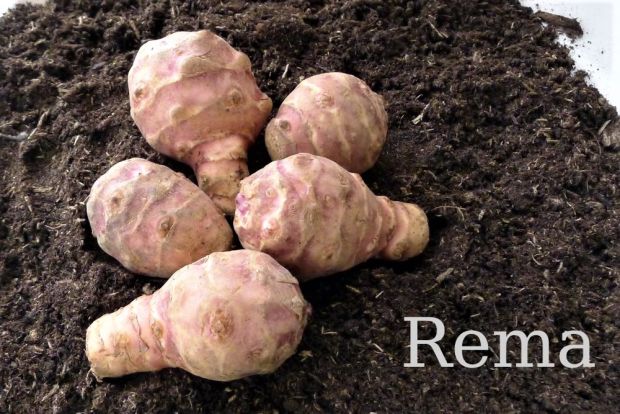We use cookies to make your experience better. To comply with the new e-Privacy directive, we need to ask for your consent to set the cookies. Learn more.
Jerusalem Artichokes Organic
Jerusalem artichoke (Helianthus tuberosus) is an extremely easy to grow and prolific vegetable. Massive yield of tubers which taste earthy when eaten in Autumn and sweeten if left in the ground over the Winter months. 1kg packs containing around 12 tubers. More details below.
|
REMA and BIANCA in stock now. |
Organic Jerusalem Artichoke Tubers
Not hailing from Jerusalem, nor an artichoke, but a species of sunflower which produces masses of edible tubers. Jerusalem artichokes originated in North America and were introduced to Europe by colonists. Fond of the climate here, they grew prolifically and have been used since for both animal and human fodder as well as to ferment into alcohol. They are receiving interest again because of their ease of growing, high yield, lack of disease problems and inulin content. The latter provides prebiotic benefits but can cause gastric upset to those not used to consuming inulin rich foods hence the nickname 'fartichokes'. Begin by eating small amounts!
Jerusalem Artichoke Varieties
- Rema - Red skinned, round and knobly, high yield
- Blanco- Pale in colour and smooth
- Bianca - Purple and knobly
Growing Jerusalem Artichokes
Jerusalem artichokes are very easy to grow but some things are worth considering
- They are large plants which can be between 1.5-3m high so be careful not to put them where they will shade out your other crops.
- From April, plant into well-prepared soil at a depth of 10-15cm with tubers spaced 30cm apart. Row spacing 1m.
- When stems are around 30cm tall, draw soil around them to a depth of 20cm to help stabilise plants as they grow.
- You can cut back stems (including flowerheads) to around 1.5m in midsummer so plants won’t be rocked by the wind, thus avoiding the need for staking.
- When foliage starts to turn yellow in autumn, prune to leave 10cm stumps above ground level. Place the prunings over plants to keep the soil warm and aid lifting of tubers in frosty weather.
- Can be left in the soil and harvested as needed. If you have heavy wet soil it is best to lift and store them.
Growing Commercially
If growing at scale, Jerusalem artichokes can be grown in drills much like potatoes and machine harvested. This is particularly useful on heavier wet soils where yields can be lower and harvesting more difficult. Grow on ridges 75cm apart with 40cm between plants. Closer planting increases yield but reduces tuber size. Earth up once or twice to control weeds and so that plants do not lodge. Fertility requirements are low with research in Holland recommending 50kg N/ha, 80kg K/ha and 10kgP/ha. Yields can be 15-25 tonnes/ha.
Harvesting
- Harvest the tubers as required with a garden fork from late autumn into winter.
- Jerusalem artichokes are persistent, so if you don’t want them coming back the following year, make sure you remove every last one - tubers left in the ground will regrow into a large plant the following spring.
- Harvested early they taste earthy. If left in the ground longer and exposed to the cold winter months they become sweeter.
How to cook
- You can cook Jerusalem artichokes peeled or unpeeled. Scrub them with a stiff brush just before you cook them. Sorting your tubers by size will simplify preparation.
- Medium-sized Jerusalem artichokes that have numerous bumps and knobs can be boiled whole in their skins and then mashed and sieved to form the basis for Jerusalem artichoke soup, which many say is the best way to eat the veggie.
- Rather than struggling to peel small, knobby tubers, scrub them well and then roast them with a little olive oil and sea salt. After they’ve cooled, eat them as finger food by squeezing the soft middle into your mouth - a North American food practice that dates back more than 1,000 years.
- Jerusalem artichokes get their sweetness from a unique sugar called inulin, which the body metabolizes much more slowly than it does other sugars. This makes the veggie a preferred food for diabetics, and for anyone who wants to avoid eating simple sugars and starches.

